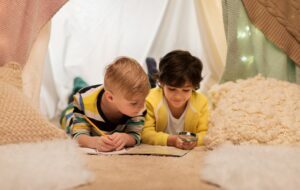This month we are talking about creating and nurturing good reading habits. One of the reading habits that it seems a little harder to encourage is reading non-fiction. It may be easy to see the appeal of a great fictional story about fantastic worlds and superheroes. When it comes to reading about historical facts or science it might be harder to see why kids should do this outside of school. They might think it will be boring or too difficult. But reading non-fiction at home and for pleasure from an early age can be a great reading habit for several reasons.
- Reading non-fiction provides children with background knowledge. Children need to know basic facts about the world, history, events, how things work, etc. While fictional books can certainly supply some of this information, non-fiction is factual and informational. Also, non-fiction may often contain things like headings, charts and other visuals that children will need to learn to interpret in the higher grades as they study subjects like math, science, and history.
- Children are likely to encounter non-fictional writing a lot in the real world. Newspapers, magazines, instruction booklets, recipes and other types of informational writing generally do not contain fiction. By starting to read non-fiction early, children may be more likely to be able to quickly absorb information from multiple sources.
- As children move into the higher grades, more and more of their reading for school will be informational texts. “So, should they have to come home and read non-fiction, too?”, you might ask. And the answer is that the earlier and more often that children are exposed to non-fiction, the better that they will be able to comprehend and analyze the informational textbooks that they will encounter in school, which can lead to better academic success and more self-confidence.
This does not mean that you should suddenly take away all of your child’s picture books and fictional chapter books and make her read math texts. Non-fiction does not have to come from textbooks. And most importantly, non-fiction does not have to be boring! It can be a great way for children to get answers to their questions about the world.
There are some absolutely beautiful and fascinating children’s non-fiction picture books that cover topics from how the Eiffel Tower was built, to baseball, to the Beatles (and other beetles, too). And there are great chapter books on history, science, art, music and more.
And who knows, your child might find his future job through reading about how stars are discovered or how flies buzz around so well. So pick up a non-fiction children’s book today and start creating another great reading habit!





